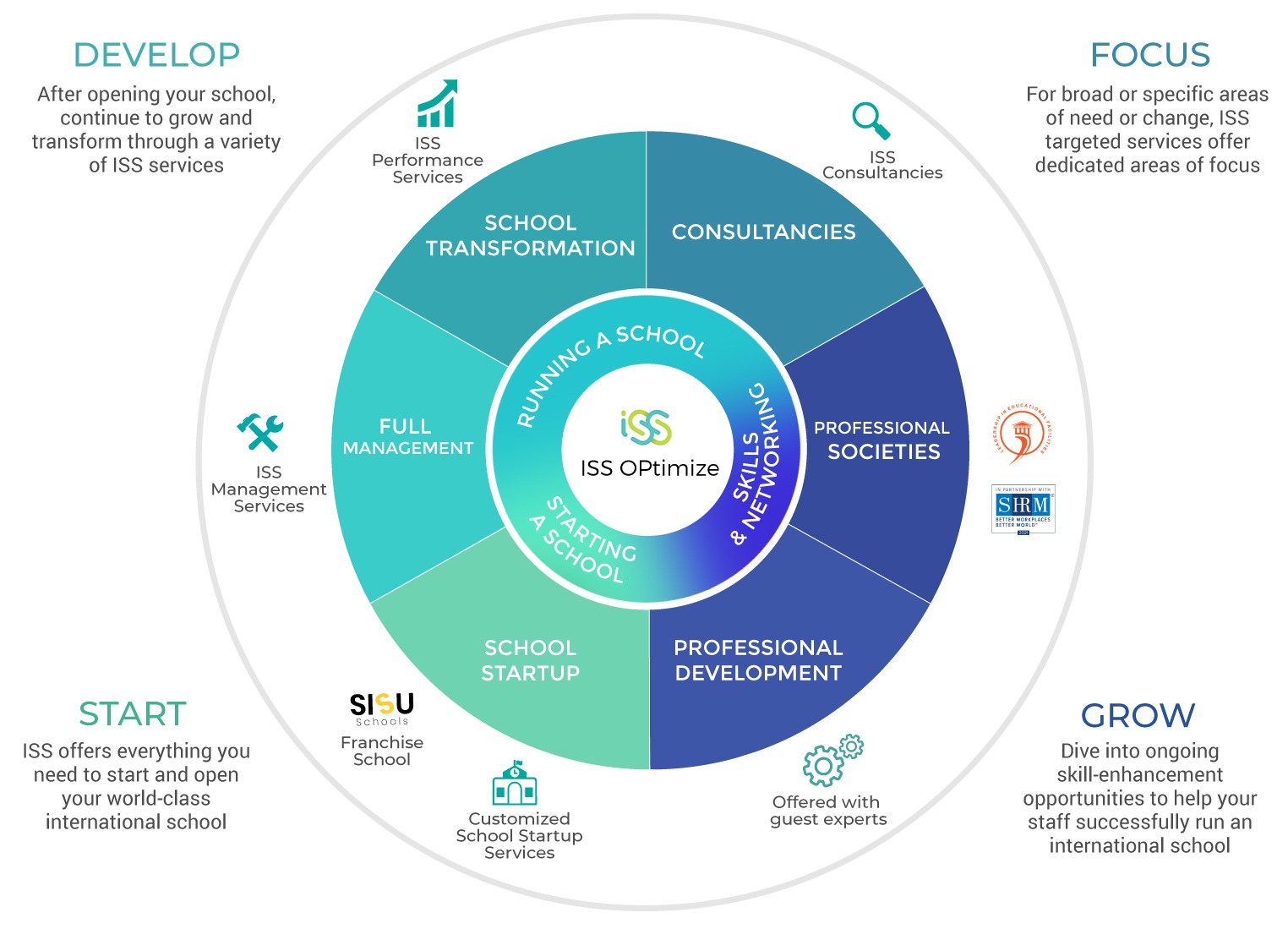NAVIGATING THE VUCA WORLD:
Strategic Imperatives, Plans, and Thinking in International Schools Collective Care
By Tom Hawkins, Ed.D., ISS Vice President for School Startups, Management, and Operations
Originally published in ISS NewsLinks, Volume XXXX, February 2024.
International schools are not immune to the VUCA (Volatility, Uncertainty, Complexity, and Ambiguity) forces of our globally connected world. Making sense of the local and regional challenges, prioritizing school initiatives, and planning for a preferred future are important elements of the success of any school.

Accreditation programs and processes help schools focus on the educational improvements needed, but strategic planning can help make sense of the VUCA imperatives which schools face. A well-crafted strategic plan serves as a compass, guiding schools toward preferred futures of educational excellence, innovation, and sustainability amid the VUCA forces at work around the globe.
Fostering Educational Excellence
Developing strategic thinking, strategic imperatives, and ultimately a strategic plan, helps schools focus on the desired future and educational excellence they purport to provide. International schools offer curricula that are diverse and inclusive, reflecting the global basis of the student and teacher population. A specific and articulate strategic plan provides a roadmap to align these educational objectives with international standards, ensuring a robust and competitive academic environment.
In addition, strategic planning enables international schools to identify and leverage their unique strengths, whether via specialized faculty, premier programs, multi-lingual fluency, cutting-edge facilities, or innovative teaching methodologies. By aligning these strengths to the challenges of the VUCA world, schools can better prepare students for the challenges and opportunities that lie ahead.
Attracting and Retaining Top Talent
Schools, and strategic plans, are only as good as the people who develop, empower, and nurture them. Attracting and retaining top talent requires creative thinking, strategic planning, and effective communication about the mission, vision, values, and benefits of being part of a specific international school.
Every good strategic plan should have what I call a “people” strategy to attract and retain great teachers, leaders, and support staff to deliver the best programs and education possible. Strategies should outline the professional development opportunities, competitive compensation packages, and supportive work culture which make the school an attractive destination for educators seeking to make a difference in schools.
In addition, strategic plans should provide a clear and compelling mission and vision, with actions, which potential teachers and leaders are seeking in their next move. This shared, compelling mission and vision, does more to enhance school culture than maybe any single endeavor a school undertakes.
Financial Sustainability and Resource Allocation
International schools are generally private, fee-paying schools set up to support the community in which they serve. Some international schools are non-profit entities while others are owned and sometimes operated as for-profit entities. Regardless of the motivation or purpose of the school, financial sustainability is imperative, though it may be the hardest issue to discuss. Without a strategy to be financially sustainable, even international schools risk becoming irrelevant in the VUCA world.
Good strategic plans address the sustainability questions by establishing clear enrollment targets, setting specific financial goals, optimizing resource allocation, and identifying potential “alternative” revenue streams if needed to support the school beyond what can be generated through tuition and fees alone.
Strategic planning can also facilitate effective budgeting through establishment of clear investment priorities (i.e. new or refurbished facilities, more or different staff, enhanced science equipment, new technology/programs, etc.) to deliver on the mission and vision of the school. With so many competing priorities for funds, the strategic plan helps to focus on the mission-critical funding needed for the preferred future of the school.
Adapting to Technological and Pedagogical Advancements
The rapid evolution of technology has revolutionized the education sector, presenting both opportunities and challenges (think of what ChatGPT has meant for schools and the world this past year). A good strategic plan can empower international schools to navigate the tech landscape by outline a comprehensive approach to integrating digital tools effectively into the teaching and learning environment.
Whether through the implementation of e-learning platforms, virtual classrooms, or interactive educational software, strategic planning ensures that schools stay at the forefront of technological advances by helping leaders and teacher focus on the intentional development of technology to enhance teaching and learning.
Strengthening Community Engagement
Our international schools thrive on a sense of community which extends well beyond the classrooms. Creating, nurturing, and sustaining this community is no small task, and left untended, the community engagement can wither and diminish over time. Strategic planning helps schools focus intentionally on community engagement among students, parents, faculty, and local stakeholders. Through initiatives such as cultural events, parent-teacher associations, and community outreach programs, our international schools can nurture and maintain that important sense of community and purpose.
Good strategic plans also enable schools to establish effective communication channels, keeping stakeholders inform about the schools progress, goals, and challenges. This communication and transparency builds trust and promotes a collaborative spirit which is essential to sustaining passion, excellence, and innovation in schools.
Conclusion
International schools are fabulous places to learn, teach, live, grow, and prosper. International schools often are key elements of communities around the globe. As schools grow and face the challenges of a VUCA world, the need for stability and strategy is paramount. Strategic imperatives, strategic thinking, and strategic planning are ways for schools to take control of crafting a preferred future. Focusing the plans on educational excellence, attracting and retaining top talent, ensuring financial sustainability, adapting to technological advances, and strengthening community engagement can provide the roadmap to navigating the VUCA world.
As international schools continue to play a crucial role in shaping the global citizens of tomorrow, strategic planning emerges as a guiding force, helping schools navigate the complexities of the VUCA educational world with Vision, Understanding, Clarity and Agility.
Contact Us
ISS School Management and Operation experts like Dr. Hawkins are working with international schools today and understand the unique challenges facing school leaders. Our ISS OPtimize team is proud to provide efficient, focused support and insight to help your school succeed.

Cayman International School
Get started today!








